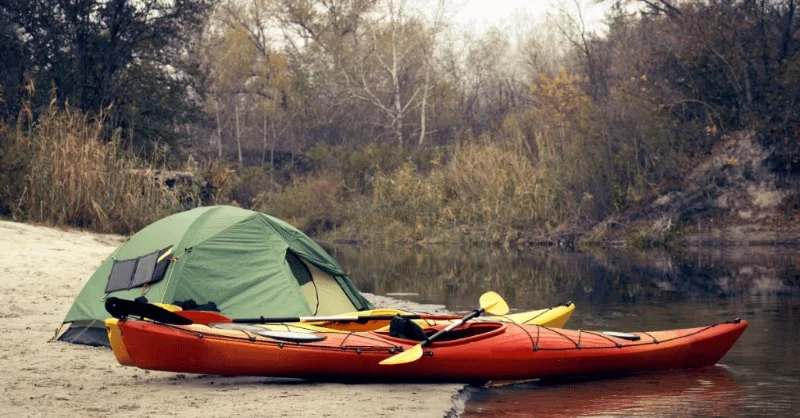Discover essential gear for kayak camping expeditions, from dry bags and compact tents to cook stoves and safety tools. Explore expert tips and real-world insights from Pine Cliff Resort.

- selecting-the-right-kayak-for-camping-expeditions
- waterproof-storage-and-packing-strategies
- camping-essentials-for-riverbank-nights
- cooking-and-food-prep-gear-on-the-water
- safety-navigation-and-communication-gear
- real-case-paddling-through-algonquin-wilderness
1. Selecting the Right Kayak for Camping Expeditions
Every great kayak camping trip begins with the right vessel. While recreational kayaks work for day trips, multi-day expeditions demand something more: capacity, comfort, and durability. Touring kayaks or sea kayaks offer additional storage and improved tracking, essential when paddling through unpredictable currents or windy lake conditions.
Inflatable kayaks can work if space is tight, but hardshell models generally offer more room and reliability. At Pine Cliff Resort, we’ve helped hundreds of guests match their kayak style to the water they’ll be navigating—whether it’s a gentle inlet or the remote stretches of Ontario’s interior lakes.
2. Waterproof Storage and Packing Strategies
2.1. Dry Bags: The Backbone of Organization
Dry bags aren’t just convenient—they’re non-negotiable. Color-coded bags help you categorize items (sleep system, food, clothes, gear), making transitions at camp faster and less stressful. Roll-top designs with compression valves can save space and protect gear from spray or capsizing.
2.2. Weight Distribution in the Hull
Pack heavy items low and near the center of your kayak to maintain balance. On my first multi-day trip along the French River, I learned the hard way—after tipping into 55°F water—that top-heavy packing can turn a calm paddle into a swim lesson. Practice your layout beforehand to avoid costly mistakes on the water.
3. Camping Essentials for Riverbank Nights
3.1. Compact Shelter and Sleep Systems
A lightweight, freestanding tent that resists moisture and bug intrusion is critical. Hammocks with rainflies are also popular if you’re setting up camp in wooded areas. For sleeping, a down-filled, compressible sleeping bag and an inflatable pad offer warmth and comfort after long paddling days.
3.2. Minimalist Camp Tools
Multifunctional gear—like a spork-knife combo or an LED lantern with USB charging—saves space without sacrificing utility. Don't forget essentials like duct tape, paracord, and a compact repair kit. At Pine Cliff Resort, our team keeps a checklist we offer to campers who want to double-check before launching off into the backcountry.
4. Cooking and Food Prep Gear on the Water
4.1. Lightweight Stove and Fuel
A compact gas or alcohol stove like the MSR PocketRocket is ideal for kayak campers. It boils water quickly, which is key when you’re cold, tired, and craving a hot meal. Avoid open-flame fires in protected zones—many campsites prohibit them during dry seasons.
4.2. Packable Cookware and Food Storage
Nesting pots, a foldable sink, and biodegradable soap are all helpful in keeping your footprint low. For food, vacuum-sealed meals and energy-dense snacks reduce waste and prep time. A bear canister or hang bag is essential in regions with active wildlife.
5. Safety, Navigation, and Communication Gear
5.1. Maps, Compass, and GPS Redundancy
Even in the age of smartphones, physical maps and a compass remain crucial. Electronics fail, but a waterproof topo map and basic orienteering knowledge will guide you through fog or unmarked forks in the waterway.
5.2. Personal Flotation Devices and Signaling Tools
Your PFD should be comfortable enough for long wear and equipped with a whistle and reflective patches. Pack a headlamp, flares, and a signaling mirror for emergencies. A handheld VHF radio or GPS communicator (like a Garmin inReach) can be life-saving in remote areas without cell service.
6. Real Case: Paddling Through Algonquin Wilderness
6.1. A Five-Day Expedition Gone Right
Last fall, two friends launched from Access Point 3 in Algonquin Provincial Park for a five-day loop. One had kayak-camped before; the other was new. Their success? Smart gear choices. They divided load weight evenly, prepped food into day bags, and used dry sacks for everything from clothes to tech.
6.2. Lessons Learned on the Water
The trip wasn’t without surprises—a night of cold rain reminded them why an extra tarp is never a bad idea. But overall, they returned confident and ready for their next challenge. For paddlers looking to follow a similar path or upgrade their gear setup, Pine Cliff Resort is the perfect starting point for outfitting and route planning alike.
West Magnolia Trailhead
Nederland, CO 80466, USA
Visit Location PageNature's Campsites
96 Ekonk Hill Rd, Voluntown, CT 06384, USA
Visit Location Page